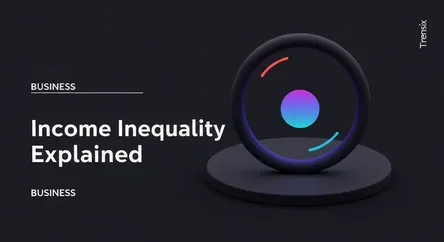Business
Income Inequality Explained

Discover what income inequality is, why it's a major global topic, and how the widening gap between the rich and poor affects society and you.
What is it?
Income inequality refers to the uneven distribution of income among a population. In simple terms, it's the gap between the earnings of the richest and the poorest individuals within a country or globally. This disparity is often measured using metrics like the Gini coefficient, where 0 represents perfect equality and 1 represents maximum inequality. When a small percentage of the population holds a large share of the total income, inequality is considered high. This economic phenomenon examines not just wages, but also income from investments, assets, and other sources, providing a comprehensive picture of financial disparity.
Why is it trending?
Income inequality is a persistent topic of debate due to several converging factors. Globalization and technological advancements have often favored high-skilled workers and capital owners, while wages for low-skilled labor have stagnated. Policy decisions, including changes to tax laws and a decline in the influence of labor unions, have also played a significant role. Major economic events like the 2008 financial crisis and the COVID-19 pandemic have further exposed and exacerbated these disparities, pushing the issue into the political and social spotlight as societies grapple with fairness and economic stability.
How does it affect people?
High levels of income inequality have profound effects on individuals and society. It can limit social mobility, making it harder for those from disadvantaged backgrounds to improve their economic standing. It's linked to poorer health and educational outcomes for lower-income groups, creating a cycle of poverty. Economically, extreme inequality can dampen consumer demand, as a large portion of the population has limited purchasing power. This can also lead to social unrest and political polarization, as feelings of unfairness and disenfranchisement grow, threatening the stability of a country's social fabric.